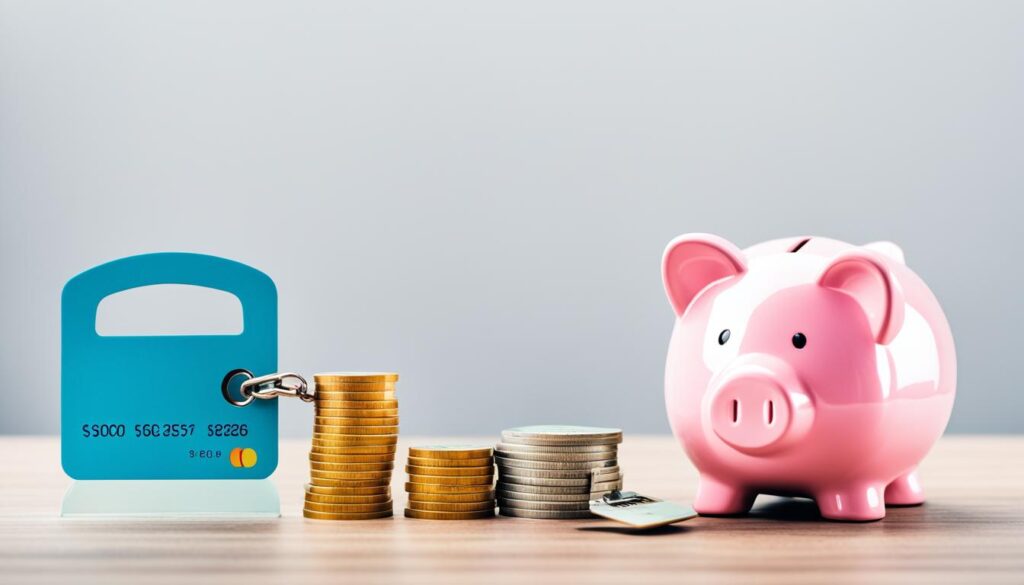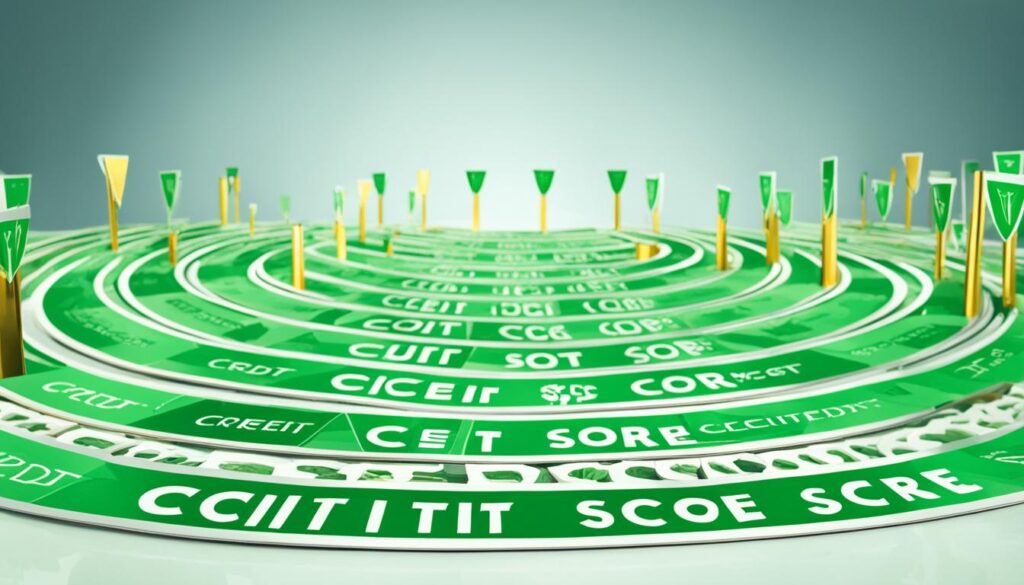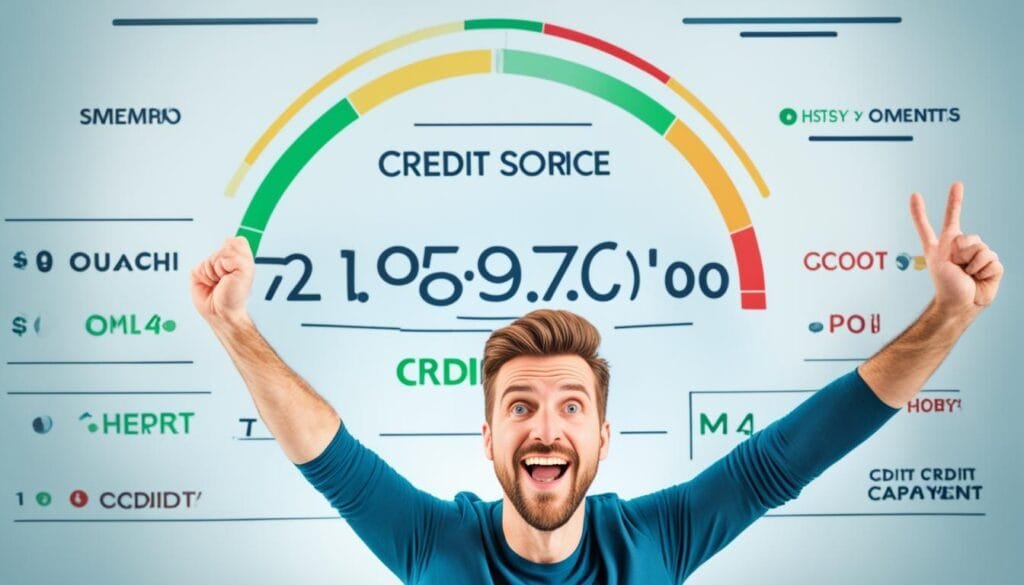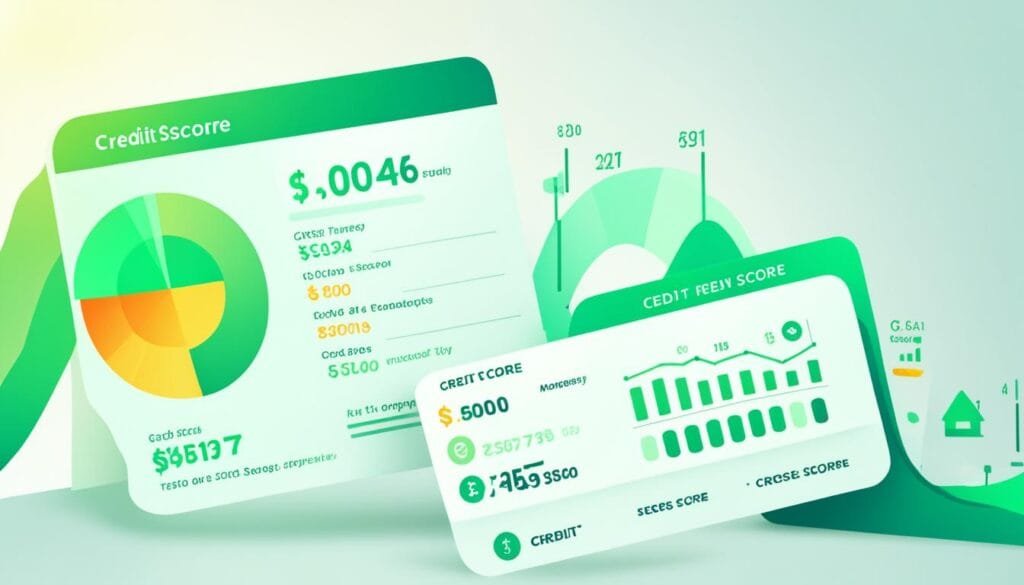Secured credit cards offer individuals with bad credit or a limited credit history the opportunity to improve their financial standing. These cards, also known as credit builder cards or bad credit cards, require a cash deposit as collateral and provide a small line of credit. By using a secured credit card responsibly, individuals can rebuild their credit history and work towards qualifying for unsecured credit cards in the future.
Key Takeaways:
- Secured credit cards are a valuable tool for individuals with bad credit or limited credit history.
- These cards require a cash deposit as collateral and provide a small line of credit.
- Using a secured credit card responsibly can help individuals rebuild their credit history and improve their credit score.
- Responsible credit card usage may lead to qualifying for unsecured credit cards in the future.
- Consider secured credit card offers and choose the best secured credit card to suit your needs.
How to Use a Secured Credit Card
To effectively use a secured credit card and reap its benefits, it is crucial to understand the key steps involved. By following the right strategies, you can build and improve your credit history while making the most out of your card.
Choosing the Right Card
When selecting a secured credit card, consider factors like whether the card issuer reports your account activity to the credit bureaus. This is essential for building a positive credit history. Additionally, look for reasonable security deposit requirements and a clear path to upgrade to an unsecured credit card in the future.
Paying the Security Deposit
After applying for a secured credit card and getting approved, you’ll need to pay the security deposit to activate the card. The deposit amount typically determines your credit limit. It is essential to budget and plan accordingly to ensure you can comfortably meet this requirement.
Using the Card Wisely
Once you have your secured credit card, it’s important to use it responsibly. Avoid maxing out the credit limit, as this can negatively impact your credit utilization ratio. Keeping your balance low demonstrates financial discipline and may enhance your creditworthiness.
Paying Balance on Time and in Full
One of the most critical aspects of using a secured credit card is making timely and full payments each month. This establishes a positive payment history and showcases your ability to manage credit responsibly. Set up automated payments or calendar reminders to ensure you never miss a due date.
Graduating to an Unsecured Credit Card
Some secured credit card issuers offer the opportunity to transition to an unsecured credit card after consistently demonstrating responsible credit behavior. This usually involves reviewing your payment history, credit score, and overall financial profile. Graduating to an unsecured credit card signifies progress in building your credit and can provide access to higher credit limits and better terms.
“Building credit with a secured credit card is a gradual process that requires disciplined financial habits.” – Financial Expert
Remember, using a secured credit card wisely is not just about building credit but also about establishing responsible financial habits. By following these steps, you can work towards your financial goals and lay the foundation for a healthy credit history.
Insert the provided image:
The Importance of Secured Credit Cards for Building Credit
Secured credit cards play a vital role in building credit for individuals with bad credit or a limited credit history. By using a secured card responsibly, individuals can demonstrate their ability to handle credit and make timely payments, which is essential for improving their credit score.
When lenders see responsible credit habits with a secured card, such as paying bills on time and maintaining a low credit utilization ratio, they may be more inclined to increase the credit line, refund the security deposit, or provide the opportunity to apply for an unsecured credit card.
Lenders’ confidence in an individual’s creditworthiness is crucial for transitioning to traditional unsecured credit cards, which often offer higher credit limits and better terms.
Why Secured Credit Cards Are Important
“Using a secured credit card is like building a solid foundation for your credit history. It shows lenders that you can responsibly manage credit and helps establish a positive credit profile, even if your past credit history is less than perfect.” – Steve Johnson, Credit Expert
Secured credit cards provide an opportunity to rebuild credit and establish a positive credit history. By consistently using a secured credit card and making timely payments, individuals can prove their creditworthiness to lenders, improving their chances of qualifying for traditional unsecured credit cards in the future.
Graduating to an unsecured credit card not only signifies lenders’ confidence in an individual’s financial responsibility but also opens doors to higher credit limits and better interest rates.
The Benefits of Building Credit with Secured Cards
| Benefits | Explanation |
|---|---|
| Improved Credit Score | Using a secured credit card responsibly can have a positive impact on a credit score, demonstrating to lenders that an individual can manage credit responsibly. |
| Lenders’ Confidence | Responsible credit management with a secured card can build lenders’ confidence in an individual’s creditworthiness, increasing the likelihood of qualifying for unsecured credit cards. |
| Increased Credit Limits | Graduating from a secured credit card to an unsecured credit card can lead to higher credit limits, providing more financial flexibility. |
| Better Terms | Unsecured credit cards often offer better terms, including lower interest rates and additional benefits, compared to secured credit cards. |
Building credit with secured credit cards is a crucial step in achieving financial goals. It allows individuals with bad credit or limited credit history to demonstrate their creditworthiness, leading to increased opportunities for obtaining unsecured credit cards with better terms and higher credit limits.
By responsibly managing secured credit cards and establishing positive credit habits, individuals can lay the foundation for a solid credit history and open doors to various financial opportunities.
The Impact of Security Deposit on Secured Credit Cards
When obtaining a secured credit card, a security deposit is required as collateral. Most secured cards match the credit limit with the amount of the security deposit. The size of the security deposit can vary depending on the issuer, with some cards allowing deposits as low as $49. The security deposit acts as a guarantee for the lender and can be vital for individuals with bad credit or a limited credit history to obtain a credit card.
By showing responsible credit habits with a secured card, individuals can increase their credit limit or have the security deposit refunded. Some secured cards even offer the opportunity to put down a larger deposit for a higher credit limit.
| Impact of Security Deposit | Key Factors |
|---|---|
| Collateral Requirements | Low collateral requirements make secured cards accessible for individuals with bad credit or limited credit history. |
| Refundable Deposit | Responsible credit habits can lead to the refund of the security deposit, providing individuals with more financial flexibility. |
| Credit Limits | Secured cards offer the potential for higher credit limits with larger deposits, allowing individuals to access more purchasing power. |
Case Study: Impact of Security Deposit on Credit Limit Increase
“After consistently making on-time payments and using my secured credit card responsibly, I noticed that my credit limit gradually increased. As I built a positive credit history, the card issuer rewarded me with a higher credit limit, allowing me to make larger purchases and further improve my credit score.”
The impact of the security deposit on secured credit cards is undeniable. It enables individuals to establish credit, expand their credit limits, and ultimately improve their financial standing. By responsibly managing a secured credit card, individuals can demonstrate their creditworthiness and open doors to more favorable credit options in the future.

Establishing Responsible Credit Habits with Secured Credit Cards
Using a secured credit card requires individuals to establish and maintain responsible credit habits. By practicing responsible credit habits, individuals can improve their credit score and increase their chances of qualifying for unsecured credit cards in the future.
One of the most important responsible credit habits is paying on time and in full. Making timely payments each month shows lenders that you are reliable and can be trusted to repay your debts. It is recommended to set up automatic payments or reminders to ensure you never miss a payment.
Another key habit is keeping your credit utilization low. Credit utilization is the percentage of your available credit that you are using. It is generally recommended to keep this ratio below 30%. For example, if you have a $500 credit limit on your secured card, try to keep your balance below $150. Low credit utilization indicates that you are not relying too heavily on credit and are managing your finances well.
Paying off balances is another responsible credit habit that can have a positive impact on your credit score. Carrying a large balance from month to month can be seen as a sign of financial instability. Paying off your balances demonstrates that you are in control of your finances and can manage your credit responsibly.
“By consistently practicing responsible credit habits with a secured credit card, individuals can show lenders their creditworthiness and improve their credit score over time.”

| Responsible Credit Habits | Benefits |
|---|---|
| Paying on time and in full | – Demonstrates reliability to lenders – Builds a positive payment history – Improves credit score |
| Keeping low credit utilization | – Indicates responsible credit management – Shows financial stability – Increases creditworthiness |
| Paying off balances | – Demonstrates control of finances – Reflects responsible credit behavior – Improves credit score |
By implementing these responsible credit habits, individuals can establish a solid foundation for their credit history and improve their overall creditworthiness. These habits not only benefit individuals with secured credit cards but can also pave the way for qualifying for unsecured credit cards and accessing higher credit limits in the future.
Pros and Cons of Secured Credit Cards
Secured credit cards can be both advantageous and disadvantageous when it comes to establishing credit. Let’s take a closer look at the pros and cons of using secured credit cards:
Pros of Secured Credit Cards:
- Building Credit: Secured credit cards provide individuals with an opportunity to establish or build credit. By using the card responsibly and making timely payments, individuals can demonstrate their creditworthiness and improve their credit score.
- Refundable Deposits: Many secured credit cards allow for a refund of the initial security deposit once the cardholder has proven their creditworthiness. This means that individuals can eventually regain their deposit, making it a more attractive option.
- Opportunity for Transition: Secured credit cards can serve as a stepping stone towards unsecured credit cards. With responsible credit usage and a positive payment history, individuals may be eligible to upgrade to an unsecured credit card, which typically offers more benefits and features.
Cons of Secured Credit Cards:
- High Fees and Interest Rates: Secured credit cards often come with higher fees and interest rates compared to traditional unsecured credit cards. It’s important to carefully review the terms and conditions to understand the associated costs.
- Low Credit Limits: Secured credit cards typically come with lower credit limits compared to unsecured credit cards. This can restrict purchasing power and necessitate regular payments to maintain a low credit utilization ratio.
- Initial Cash Deposit: To open a secured credit card, individuals are required to make an initial cash deposit as collateral. This means tying up funds that may not be immediately accessible for other financial needs.
Before applying for a secured credit card, it is crucial to consider these pros and cons to determine if it aligns with individual financial goals and circumstances. The benefits of establishing credit and the potential for future credit opportunities should be weighed against the drawbacks, such as high fees and interest rates, low credit limits, and the need for an initial deposit.
How Can Secured Credit Cards Help Build Better Credit?
Secured credit card benefits are essential for improving credit. By using a secured credit card, individuals can demonstrate responsible financial behavior, leading to a better credit score. Timely payments and low credit utilization show lenders that you can manage credit effectively, ultimately helping to build better credit.
Conclusion
Secured credit cards play a crucial role in helping individuals with bad credit or a limited credit history rebuild their credit and achieve financial stability. By using these cards responsibly and establishing responsible credit habits, individuals can improve their credit score and gain access to unsecured credit cards in the future.
Building credit with a secured credit card involves making timely payments, keeping credit utilization low, and paying off balances in full. These responsible credit habits demonstrate to lenders that an individual can manage credit responsibly.
While there may be considerations and challenges associated with secured credit cards, such as high fees and low credit limits, the benefits of building credit and achieving financial goals far outweigh the drawbacks. Secured credit cards provide a valuable opportunity to establish a positive credit history, which can lead to higher credit limits and better terms in the long run.
Overall, using secured credit cards responsibly and practicing responsible credit habits is a significant step towards financial stability and improved creditworthiness. By taking advantage of the opportunities and benefits that secured credit cards offer, individuals can pave the way for a brighter financial future.
FAQ
What is a secured credit card?
A secured credit card is a type of credit card that requires a cash deposit as collateral. It is designed for individuals with bad credit or a limited credit history to help them rebuild credit.
How does a secured credit card work?
To obtain a secured credit card, you must provide a cash deposit which serves as collateral. The credit limit is usually equal to the amount of the security deposit. By using the card responsibly and making timely payments, you can improve your credit score over time.
How can a secured credit card help build credit?
Secured credit cards provide individuals with bad credit or a limited credit history the opportunity to demonstrate responsible credit habits. By making on-time payments and keeping the credit utilization ratio low, individuals can show lenders their creditworthiness and improve their credit score.
Can a secured credit card be upgraded to an unsecured credit card?
Yes, some secured credit cards may automatically transition to unsecured credit cards after demonstrating responsible credit behavior. This transition shows lenders’ confidence in the individual’s creditworthiness and can lead to higher credit limits and better terms.
How much is the security deposit for a secured credit card?
The security deposit for a secured credit card can vary depending on the issuer. Some cards allow deposits as low as $49, while others may require larger deposits. The size of the security deposit determines the credit limit, and some cards may offer the opportunity to put down a larger deposit for a higher credit limit.
What are responsible credit habits with a secured credit card?
Responsible credit habits with a secured credit card include making on-time payments in full each month, keeping the credit utilization ratio low, and paying off balances. By consistently practicing these habits, individuals can show lenders their creditworthiness and improve their credit score over time.
What are the pros and cons of secured credit cards?
The pros of secured credit cards include the ability to establish or build credit, the potential refund of the security deposit, and the opportunity to transition to an unsecured credit card. The cons include high fees and interest rates, low credit limits, and the need for an initial cash deposit.
Are secured credit cards a good option for rebuilding credit?
Yes, secured credit cards are a valuable tool for rebuilding credit. By using a secured card responsibly and establishing responsible credit habits, individuals can improve their credit score and gain access to unsecured credit cards in the future.
Source Links
- https://www.equifax.com/personal/education/credit-cards/articles/-/learn/what-is-a-secured-credit-card-do-they-build-credit/
- https://www.bankrate.com/finance/credit-cards/how-to-use-secured-credit-card-to-rebuild-credit/
- https://www.bankrate.com/personal-finance/credit/build-credit-with-secured-credit-card/

